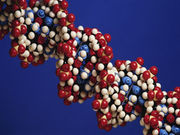Prevalence of 11.8 percent for germline DNA-repair gene mutations presumed to be deleterious
THURSDAY, July 7, 2016 (HealthDay News) — For men with metastatic prostate cancer, the incidence of germline mutations in genes associated with DNA-repair processes is 11.8 percent, according to a study published online July 6 in The New England Journal of Medicine.
Colin C. Pritchard, M.D., Ph.D., from the University of Washington in Seattle, and colleagues recruited 692 men with documented metastatic prostate cancer. They isolated germline DNA and, with multiplex sequencing assays, examined mutations in 20 DNA-repair genes associated with autosomal dominant cancer-predisposition syndromes.
The researchers identified 84 germline DNA-repair gene mutations that were presumed to be deleterious in 82 men (11.8 percent). The mutations were localized to 16 genes, including BRCA2, ATM, CHEK2, BRCA1, RAD51D, and PALB2. The frequency of mutations did not differ according to the presence of family history of prostate cancer or age. Among men with metastatic prostate cancer, the frequency of germline mutations in DNA-repair genes significantly exceeded the prevalence among men with localized prostate cancer (4.6 percent), including men with high-risk disease. The prevalence was 2.7 percent in the Exome Aggregation Consortium, which included 53,105 individuals without known cancer diagnoses.
“The incidence of germline mutations in genes mediating DNA-repair processes among men with metastatic prostate cancer was 11.8 percent, which was significantly higher than the incidence among men with localized prostate cancer,” the authors write.
Copyright © 2016 HealthDay. All rights reserved.








